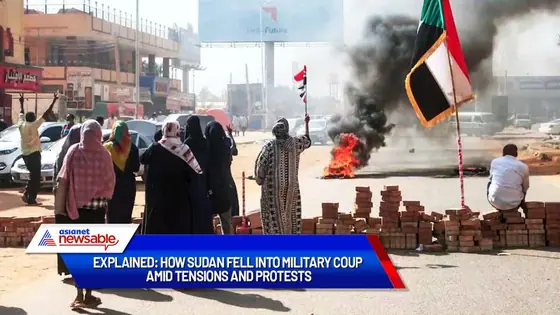
Explained: How Sudan fell into military coup amid tensions and protests
Thousands of defiant protesters took to streets in the capital, Khartoum, and its twin city of Omdurman following the early morning arrests of Prime Minister Abdalla Hamdok and other senior officials by security forces in the country, opposing Sudan's military seizing power from a transitional government.
Thousands of defiant protesters took to streets in the capital, Khartoum, and its twin city of Omdurman following the early morning arrests of Prime Minister Abdalla Hamdok and other senior officials by security forces in the country, opposing Sudan's military seizing power from a transitional government.

On Monday coup leader Gen Abdel Fattah Burhan dissolved civilian rule and declared an emergency. He also announced that the military would hold power until elections can be held in July 2023. The coup has drawn global condemnation.
The move comes after months of mounting tensions between the military and civilian authorities. Protesters are in the streets denouncing the takeover, and troops have opened fire, killing some of the marches.
Today we decipher what led to Sudan’s failure, shunting the country of 40 million into great turmoil.
Sudan has been simmering with tensions for months between supporters of the military and of civilian rule. Civilian leaders and their military counterparts have been at odds since long-time ruler Omar al-Bashir was overthrown in 2019.
The main protest umbrella group, The Forces for the Declaration of Freedom and Change or FDFC, has been stepping up calls for the military to hand leadership over to civilians in the government. The FDFC is made up of various anti-al-Bashir political parties, professional movements and rebel groups, according to news agency Associated Press (AP) report.
It has also called for restructuring the military and security agencies to dismiss al-Bashir loyalists, absorb various armed factions into their ranks and be put under civilian supervision.
Supporters of the military also have stepped up action. Since September, tribal protesters have blocked the main road to Sudan’s Red Sea port as well as fuel pipelines, demanding Hamdok’s government be dissolved, AP reported.
Also, a pro-military splinter faction of the FDFC began an anti-government protest sit-in this month outside the Sovereign Council headquarters, accusing officials of mismanagement and monopolizing power. The faction includes rebel groups that struck peace deals with the military and some political parties.
At least seven people have been killed in the ongoing protests, according to a health ministry statement late on Monday.